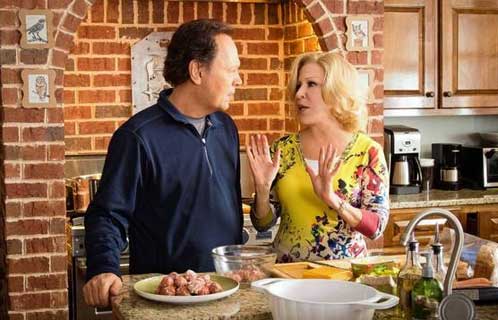Adelaide Now
FROM good movies we can learn much about life.
01-25-2013
We learn how to fake a you-know-what in When Harry Met Sally.
We learn to be wary of one-night stands thanks to Fatal Attraction.
And we learn father-son relationships can be tough thanks to Star Wars.
Parental Guidance, starring Billy Crystal and Bette Midler as straight-talking grandparents, is most definitely a movie that teaches us things.
Critics have panned it, but my family and I loved it.
Maybe it touched a nerve … in the movie, over-achieving and hyper-controlling parents Alice (played by Marisa Tomei) and Phil Simmons (Tom Everett Scott) go on a work trip, leaving their precocious prodigies Harper, Barker and Turner in the hands of Diane (Midler) and Artie (Crystal).
The Simmons children are being raised in an all-too-familiar world in which children don’t ever lose at sport, don’t ever hear the word “no” and get counselling rather than criticism.
It’s immediately apparent that the children are growing up in a different world to that of Diane and Artie , who was quickly dubbed “Fartie” by charming little Barker.
In the movie, kids playing Little League baseball don’t ever get struck out – they just keep hitting until they get on first base.
Food is the enemy, and sugar is banned because it sends the kids “off the rails of the crazy train”, as Alice tells her parents.
And even swearing by adults is outlawed.
Alice isn’t placated when Diane tells her that if Artie swears around the kids, “she’ll break his freakin’ arm”. Sadly, it all sounds very familiar.
Alice tells her parents: “There’s a certain way we talk to our kids. For instance, where you would say `no’, we would say `consider the consequences’.” She goes on: “Where you would say `don’t’, we would say `maybe you should try this’.
“See, that way the child sees that he has value, he has worth, he’s heard.”
Luckily, we don’t hear what Artie and Diane really think about this approach.
While it’s an extreme example, it’s the sort of conversation taking place in homes, kindies, childcare centres and schools across Australia. These days, kids aren’t brats, they are just misunderstood.
They aren’t naughty, they have a syndrome. And they should be consulted rather than told what to do.
It’s no wonder that parents (me included) sometimes feel that our kids are out of control.
A spokeswoman from Grandparents Australia recently told me that the biggest issue between grandparents and their children is the lack of manners and poor behaviour of their grandchildren. Put bluntly, nannas and pops across the land love their grandkids, but think they would be better off with a good old-fashioned dose of discipline, plain-speaking and a cuff across the ear from time to time.
Now, while I don’t like the idea of hitting kids, I do think children are not adults and they should not expect to be treated like them. Clearly, the pendulum has swung too far towards the rights of kids and away from the rights of parents.
It’s reflected in the new federal guidelines for early childhood settings.
Early childhood teachers, we are told, now spend a lot of time “listening, watching and talking” to children rather than telling them to do anything. As my son’s kindy teacher told us the other day, “if kids don’t want to draw or hold a crayon, they don’t have to”.
OK, but what if what they want to do is pull their pants down and fingerpaint with their bottoms?
What then?
They may not like it – but children do need discipline and boundaries.
And children do not benefit when they are over-indulged all the time.
So what, then, can we learn from a movie like Parental Guidance? Surely it’s that grandparents might not understand the importance of gluten-free bread or have a counsellor on speed-dial, but they probably know more about raising kids than we do.









WOW! I read this this morning at work and thought of sending it to you once I got home (I live in Adelaide), how bizzare! Now I can turn off the scanner!
Hope all is well!!!
xxx
Thanks for the kind thought Kristan! Welcome to BLB! xx